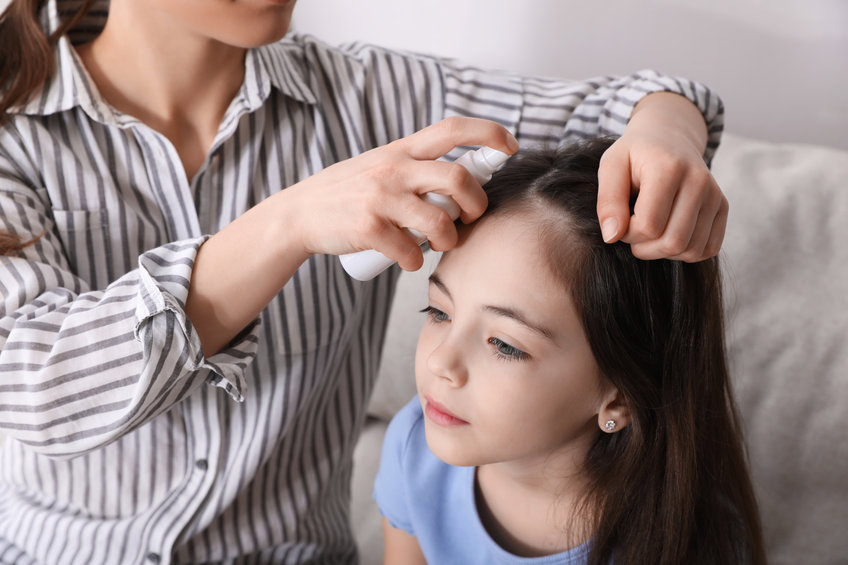Topical treatments for head lice
Your youngster is sent home early from school because they have head lice! After panicking, what is a parent to do? Do you need to go to the doctor? How do you treat those pesky head lice?
You should get your child to their medical doctor as soon as possible. They will be able to confirm an active lice infestation and recommend what treatment is best for you. Some areas in the United States are showing resistance to OTC medications; if you live in one of these areas, your medical provider will provide a prescription treatment for you.
Over the counter treatment options: While it may seem like there are many OTC treatment options for head lice, they’re all based on pyrethrin. Pyrethrin is chemical derived from the chrysanthemum flower; it is toxic to lice but does not kill their eggs (also called nits). Hair should be washed with shampoo before use of topical OTC treatments, but do not use conditioner before applying the treatment. Follow the package instructions carefully and be sure to rinse your child’s hair over a sink rather than in the shower or bath to limit skin exposure. If your child has an allergy to ragweed or chrysanthemums, you should not use permethrin or pyrethrin based treatments.
• Permethrin: Also known by the brand name Nix, permethrin is a synthetic form of pyrethrin. Treatment must be repeated 9-10 days after initial application because it does not kill nits. Common side effects after treatment with permethrin are redness and an itchy scalp.
• Pyrethrin with piperonyl butoxide: Also known by the brand name Rid, pyrethrin is combined with another chemical called piperonyl butoxide to make it more effective against lice. Again, the application must be repeated 9-10 days after initial application because it does kill nits. Common side effects are the same as permethrin and treatment may cause a red or itchy scalp.
Prescription treatment options: Depending on where you live, your doctor may recommend a prescription treatment option right away because of growing resistance in your area. They may also recommend a prescription treatment if OTC options were not effective at getting rid of lice. You should follow your medical doctor’s instructions and treatment schedule exactly. Be sure to rinse your child’s hair over a sink rather than in the shower or bath to limit skin exposure.
• Ivermectin: Also known by the brand name Sklice, ivermectin is a prescription lice treatment that kills both adult lice and their eggs. It is applied to dry hair and left on for 10 minutes. Common side effects include burning and scalp irritation. Ivermectin is safe to use for children 6 months of age and older. A single treatment is usually enough for most patients but should be repeated in 7-9 days if live lice are found.
• Spinosad: Also known by the brand name Natroba, spinosad is a prescription lice treatment that kills both adult lice and their eggs. It is applied to dry hair and left on for 10 minutes. Common side effects include burning and scalp irritation. Spinosad is safe to use for children 6 months of age and older. One treatment is usually enough to get rid of lice and their nits, but it should be repeated in 7-9 days if live lice are found.
• Malathion: Also known by the brand name Ovide, malathion is a prescription lice treatment that kills both adult lice and their eggs. It is applied to dry hair and must be left on for 8-12 hours before rinsing out. Common side effects including stinging and scalp irritation. Malathion is flammable; ensure that the bottle as well as hair wet with malathion is not exposed to open flame or a heat source. Malathion should not be used on children under the age of 2. A single treatment is usually enough for most patients but should be repeated in 7-9 days if live lice are found.
Home remedies: There are many “alternative” and “natural” treatment options recommended on the internet, but more studies are needed to evaluate safety and effectiveness of these treatments. These may include wet combing, essential oils, smothering agents such as mayonnaise, and dehydration. You should not try to treat head lice with any of these methods without first discussing them with your trusted healthcare provider.
Flammable products like kerosene or gasoline should never be used to treat head lice.
TL;DR: If your child has head lice, it is important you make an appointment with their healthcare provider as soon as possible. They can recommend the most safe and effective treatment for you. It is important to follow their directions and treatment schedule exactly to get rid of a head lice infestation.
References:
- Centers for Disease Control and Prevention. Head Lice, 2019. Atlanta, GA: U.S. Department of Public Health, Centers for Disease Control and Prevention. https://www.cdc.gov/
parasites/lice/head/treatment.html - Marion, DW. Pediculosis capitis. In: UpToDate, Post, TW (Ed), UpToDate, Waltham, MA, 2022.
- Frankowski, B. L., Bocchini, J. A., & Council on School Health and Committee on Infectious Diseases. (2010). Head lice. Pediatrics, 126(2), 392-403.











